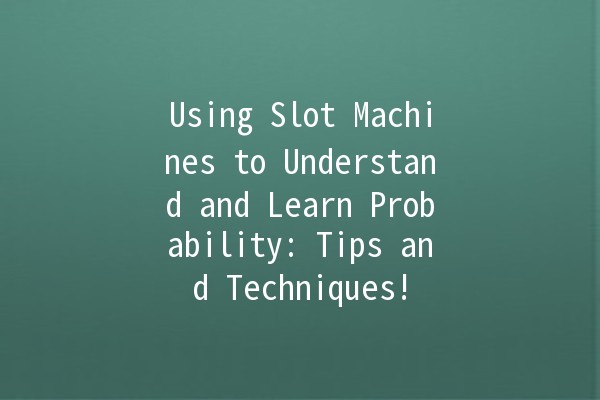Understanding probability is an essential aspect of many fields, including finance, gaming, and decisionmaking. One unique way to learn about probability is through slot machines, which are not only entertaining but also serve as practical examples of probability in action. In this article, we will explore various tips and techniques that can enhance your understanding of probability through slot machines.
The Basics of Probability
Before delving deeper into how slot machines can aid in learning probability, it’s important to understand the basic principles of probability itself. Probability is the measure of the likelihood that an event will occur. It is expressed as a number between 0 (impossible event) and 1 (certain event). For instance, the probability (P) of flipping a coin and getting heads is P(heads) = 0.5, as there are two possible outcomes: heads or tails.
Key Terms in Probability

How Slot Machines Work
Slot machines are games of chance that involve spinning reels with various symbols. Each spin is an independent event, and the results are random, determined by a Random Number Generator (RNG). Understanding how these machines work can offer insights into probability.
The Mechanics of a Slot Machine
To better understand the probability of winning on a slot machine, one must consider how many symbols are on each reel and how many winning combinations are present.
Practical Tips for Learning Probability Using Slot Machines
Understanding the odds of winning on a slot machine is crucial. Different machines have different payout percentages, which are usually expressed as Return to Player (RTP). An RTP of 95% means that, theoretically, for every $100 wagered, $95 is returned to players over the long term.
Application Example:
Activity: Choose a variety of slot machines with known RTPs.
Learning Outcome: Calculate the potential return on a $100 bet for each machine. Understanding these odds can help you make informed choices about which machines to play.
Every slot machine comes with a paytable that outlines potential payouts for various combinations of symbols. This information is essential in calculating the expected value of your bets.
Application Example:
Activity: Review the paytable of a chosen slot machine.
Learning Outcome: Determine which combinations provide the highest payouts and calculate the expected value (EV) of different betting strategies based on the paytable.
Utilize online slot machine simulators that allow you to play without risking real money. These simulations can help reinforce your understanding of probability without the financial risk.
Application Example:
Activity: Participate in free online slot machine games.
Learning Outcome: Track results over multiple spins and analyze how often different combinations occur. This will help solidify your understanding of probability distributions.
Slot machines vary in their mechanics and payout structures. By comparing different machines, you can observe how probability impacts gameplay.
Application Example:
Activity: Spend time at a casino or an online platform with multiple slot machines.
Learning Outcome: Keep a log of spins and outcomes on several machines to see how payout structures affect gameplay. Analyze which machines tend to pay out more frequently or offer higher jackpots.
Investigate various betting strategies, such as the Martingale or D’Alembert systems, which can deepen your understanding of risk and probability.
Application Example:
Activity: Implement different betting strategies during your gameplay.
Learning Outcome: Assess how these strategies impact your overall bankroll and the theoretical probability of increasing your winnings.
Using slot machines to learn about probability provides a fun and interactive way to grasp complex concepts. By analyzing odds, learning paytable dynamics, utilizing simulators, comparing machines, and exploring betting strategies, individuals can enhance their understanding of probability through practical application.
Frequently Asked Questions (FAQs)
Slot machines are a practical example of probability in action as each spin is an independent event with adjustable odds determined by the RNG. Understanding the different outcomes and their probabilities can enhance your grasp of statistical principles.
RTP is the percentage of total bets that a slot machine is designed to return to players over time. It's essential for helping players understand their likelihood of winning over a longterm period.
You can determine the best machine by researching its RTP, paytable, and variance. Machines with higher RTP and favorable paytables generally offer better returns.
No, there are no guaranteed strategies for winning on slot machines, as they are based on chance. However, understanding odds and making informed decisions can help manage your bankroll effectively.
Yes, playing slot machines can enhance your understanding of probability concepts such as odds, expected value, and randomness, while providing practical experience in analyzing outcomes.
In the context of slot machines, each spin is an independent event since the outcome does not affect future spins. Understanding this helps reinforce the randomness of slot machine results.
By employing these tips, players can not only improve their game but also cultivate a deeper understanding of probability through their interactions with slot machines. Understanding probability can lead to smarter decisions in gaming and other facets of life where chance plays a significant role.